Russian Imperialism
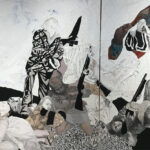
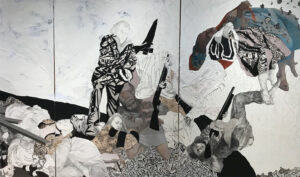
Yulia Gasio, a faculty member at California State University, Long Beach, reflects her family’s traumatic experiences of survival during the war in the Donbas in eastern Ukraine.
Sergei Nikolsky, a Russian philosopher specializing in culture, argues that perhaps the most important thought for Russians “from the fall of Byzantium to the present day is the idea of empire and being an imperial nation. We have always known that we inhabit a country whose history is an uninterrupted chain of territorial expansions, conquests, annexations, their defense, temporary losses and new conquests. The idea of empire was one of the most valuable ideas in our ideological baggage and it was it that we proclaimed to other nations. It is through it that we surprise, delight or panic the rest of the world.”
The first and most important feature of the Russian Empire, Nikolsky says, has always been “the maximization of territorial expansion for the realization of economic and political interests as one of the most important principles of state policy.” (1) This expansion was the effect of the permanent and overwhelming predominance of Russia’s extensive development over its intensive development: the predominance of the absolute exploitation of direct producers over their relative exploitation, that is, that based on the increase in labor productivity.
“The Russian Empire was called ‘the prison of the peoples’. We know today that it was not only the Romanov state that deserved this qualifier,” wrote Mikhail Pokrovsky, the most outstanding Bolshevik historian. He proved that already the Grand Duchy of Moscow (1263-1547) and the Tsardom of Russia (1547-1721) were “prisons of the peoples” and that these states were built on the corpses of the “inorodtsy”, non-Russian indigenous peoples. “It is doubtful that the fact that in the veins of the Great Russians flows 80% of their blood is a consolation for those who survived. Only the complete annihilation of Great Russian oppression by this force, which has struggled and still struggles against all oppression, could be a form of compensation for all their suffering.” (2) These words of Pokrovsky were published in 1933, just after his death and shortly before at Stalin’s request, in the Bolsheviks’ historical formula “Russia – prison of the peoples”, the first term was replaced by another word: tsarism. Then the Stalinist regime stigmatized Pokrovsky’s scientific work as an “anti-Marxist conception” of Russian history (3).
“Military-feudal imperialism”
Over the centuries, until the collapse of the USSR in 1991, the peoples conquered and annexed by Russia suffered three successive forms of Russian imperialist domination. “Military-feudal imperialism” was the first, so named by Lenin. It is not useless to discuss which mode of exploitation predominated there: feudal or tributary, or, as Yuri Semenov prefers, “political” (4). This debate is made current by the most recent research of Alexander Etkind. It follows that it was colonial modes of exploitation that dominated then: “both in its distant borders and in its dark depth, the Russian Empire was an immense colonial system“; “a colonial empire like Great Britain or Austria, but at the same time a colonized territory, like the Congo or the West Indies.” The highlight is that “Russia, by expanding and absorbing the very large spaces, colonized its own people. It was a process of internal colonization, a secondary colonization of its own territory.”
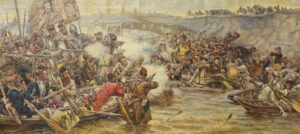
Yermak’s “Conquest of Siberia” painted in 1895 by Vasily Surkov, depicting the battle of 1582.
It is for this reason, Etkind explains, that “Russian imperialism must be conceived not only as an external process, but also as an internal process” (5). Serfdom – generalized by law in 1649 – was just as colonial as the slavery of blacks in North America, but it concerned the Great Russian peasants as well as others, considered by Tsarism as “Russian”: the “Little Russian” (Ukrainian) and Belarusian peasants. Etkind draws attention to the fact that, even in Greater Russia, peasant insurrections had an anti-colonial character, and that the wars, by which the empire crushed these revolts, were colonial. Paradoxically, the imperial center of Russia was at the same time an internal colonial periphery, in which the exploitation and oppression of the popular masses was more severe than in many conquered and annexed peripheries.
When “modern capitalist imperialism” emerged, Lenin wrote that the Tsarist empire was “wrapped, so to speak, in a particularly tight web of pre-capitalist relations” – so tight that “what generally predominates in Russia is military-feudal imperialism.” As a result, he wrote, “in Russia the monopoly of military force, of an immense territory or particularly favorable conditions for plundering non-Russian indigenous peoples, China etc., partially and incompletely replaces the monopoly of modern finance capital” (6). At the same time, as the imperialism of the least developed of the six greatest powers, it was only a sub-imperialism. As Trotsky put it, “Russia thus paid the right to be an ally of advanced countries, to import capital and to pay interest on it, that is, in short, the right to be a privileged colony of its allies; but, at the same time, it acquired the right to oppress and despoil Turkey, Persia, Galicia, and in general weaker countries, more backward than itself. The equivocal imperialism of the Russian bourgeoisie had, basically, the character of an agency at the service of the greatest world powers. (7)
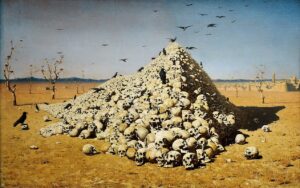
Vasily Vereshchagin, The Apotheosis of War (1871)./State Tretyakov Gallery. Vereshchagin had traveled with the Russian Army a few years before as it conquered much of Central Asia.
No decolonization without separation
It was precisely the powerful extra-economic monopolies mentioned by Lenin that guaranteed Russian imperialism continuity after the overthrow of capitalism in Russia by the October Revolution. Contrary to Lenin’s earlier announcements that the norm of socialist revolution would be the independence of the colonies, only those colonies that the expansion of the Russian revolution had not reached, or that repelled it, separated from Russia. In many peripheral regions, its expansion had the character of a “colonial revolution”, led by Russian settlers and soldiers without the participation of oppressed peoples, or even with the maintenance of existing colonial relations. Georgy Safarov described such a course of the revolution in Turkestan (8). Elsewhere, it had the character of military conquest, and some Bolsheviks (Mikhail Tukhachevsky) very quickly concocted a militarist theory of the “revolution led from outside” (9).
The history of Soviet Russia has belied the view of the Bolsheviks that with the overthrow of capitalism the relations of colonial domination of some peoples over others would disappear and that consequently these peoples could, or even should, remain within the framework of the same state. The “imperialist economism” denying the right of peoples to self-determination, which (criticized by Lenin) was spreading among the Russian Bolsheviks, was an extreme manifestation of this. In reality, it is quite the opposite: the state separation of an oppressed people is the precondition for the destruction of colonial relations, even if it does not guarantee it. Vassyl Shakhrai, Bolshevik militant of the Ukrainian revolution, had already understood this in 1918 and publicly polemicized with Lenin on this issue (10). Many other non-Russian communists understood this, especially the leader of the Tatar revolution Mirsaid Sultan Galiev. He was the first communist eliminated at Stalin’s request from public political life, as early as 1923.
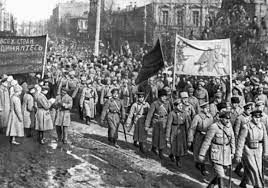
Ukrainian-Soviet War, 1917-21
In reality, imperialism based on the extra-economic monopolies mentioned by Lenin reproduces itself spontaneously and unnoticed in many ways even when it loses its specifically capitalist base. It is for this reason, as Trotsky demonstrated as early as the 1920s, that Stalin “became the bearer of Great Russian national oppression” and quickly “guaranteed the predominance of Great Russian bureaucratic imperialism” (11). With the establishment of the Stalinist regime, we witnessed the restoration of Russia’s imperialist domination over all these peoples, once conquered and colonized, who remained within the borders of the USSR where they constituted half of the population, as well as over the new protectorates: Mongolia and Tuva.
Rise of bureaucratic imperialism
This restoration was accompanied by deadly police violence and even genocide – extermination by hunger known in Ukraine as the Holodomor and in Kazakhstan as the Jasandy Acharchylyk (1932-1933). The national Bolshevik cadres and the national intelligentsia were exterminated and intensive Russification was initiated. Small entire peoples and national minorities were deported (the first major deportation in 1937 affected Koreans living in the Soviet Far East). Internal colonialism spread once again and “the most awful example of these practices was the exploitation of Gulag prisoners, which can be described as the extreme form of internal colonization” (12). As under Tsarism, the immigration of the Russian and Russian-speaking population to the peripheries calmed tensions and socio-economic crises in Russia, while guaranteeing the Russification of the peripheral republics. Overcrowded, impoverished and starving as a result of forced collectivization, the Russian countryside massively exported labor power to the new industrial centers on the periphery of the USSR. At the same time, the authorities were hindering the migration to the cities of the local – non-Russian – population from the countryside.
The colonial division of labor distorted or even hindered development, sometimes even transformed republics and peripheral regions into sources of raw materials and areas of monoculture. This was accompanied by a colonial division of the city and the countryside, physical and intellectual labor, skilled and unskilled, well or poorly remunerated, as well as an equally colonial stratification of the state bureaucracy, the working class and entire societies. These divisions and stratifications guaranteed ethnically Russian and Russified elements privileged social positions regarding access to income, skills, prestige and power in the peripheral republics. The recognition of ethnic or linguistic “Russianness” in the form of “public and psychological wages” – a concept that David Roediger took up from W.E.B. Du Bois and applied in his studies of the American white proletariat (13) – became an important means of Russian imperialist domination, and of the construction of an imperialist “Russianness” also within the Soviet working class.
During the Second World War, the participation of the Stalinist bureaucracy in the struggle for a new division of the world was an extension of domestic imperialist policy. During the war and after its end, the Soviet Union recovered much of what Russia had lost after the revolution, and also conquered new territories. Its area has grown by more than 1.2 million km2, reaching 22.4 million km2. After the war, the area of the USSR exceeded by 700,000 km2 that of the Tsarist Empire at the end of its existence, and was 1.3 million km2 smaller than the area of this empire at the peak of its expansion – in 1866, just after the conquest of Turkestan and shortly before the sale of Alaska.
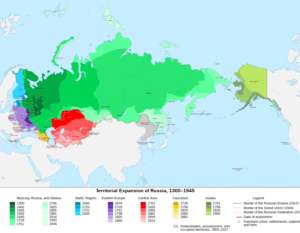
In struggle for a new division of the world
In Europe, the Soviet Union incorporated the western regions of Belarus and Ukraine, subcarpathian Ukraine, Bessarabia, Lithuania, Latvia, Estonia, part of East Prussia and Finland, and in Asia Tuva and the southern Kuril Islands. Its control has been extended throughout Eastern Europe. The USSR postulated that Libya be placed under its tutelage (22). It tried to impose its protectorate on the major Chinese border provinces – Xinjiang (Sin-kiang) and Manchuria. Moreover, it wanted to annex northern Iran and eastern Turkey, exploiting the aspiration for liberation and unification of many local peoples. According to the Azerbaijani historian Djamil Hasanly, it was in Asia and not in Europe that the “Cold War” began, as early as 1945 (14).
“As soon as political conditions permit, the parasitic character of the bureaucracy manifests itself in imperialist plunder,” wrote Jean van Heijenoort, Trotsky’s former secretary and future historian of mathematical logic. “Does the appearance of elements of imperialism imply a revision of the theory that the USSR is a degenerate workers’ state? Not necessarily. The Soviet bureaucracy is generally nourished by the appropriation of the work of others, which we had long conceived as inherent in the degeneration of the workers’ state. Bureaucratic imperialism is only a special form of this appropriation. (15)
The Yugoslav communists soon became convinced that Moscow “wanted to completely submit the economy of Yugoslavia and make it a mere complement providing raw materials to the economy of the USSR, which would slow down industrialization and disrupt the socialist development of the country” (16). Soviet-Yugoslav “joint enterprises” were to monopolize the exploitation of Yugoslavia’s natural wealth that Soviet industry needed. The unequal trade between the two countries was to guarantee the Soviet economy surplus profits to the detriment of the Yugoslav economy.
After the break of Yugoslavia with Stalin, Josip Broz Tito says that, starting with the Ribbentrop-Molotov Pact (1939) and especially after the “Big Three” conference in Tehran (1943), the USSR took part in the imperialist division of the world and “consciously pursued the old tsarist path of imperialist expansionism“. He also said that the “theory of the ruling people within a multinational state” proclaimed by Stalin “is only the expression of the fact of submission, national oppression and economic plundering of other peoples and countries by the ruling people” (17). In 1958, Mao Zedong quipped in talking with Khrushchev: “There was a man named Stalin, who took Port Arthur, turned Xinjiang and Manchuria into semi-colonies, and formed four joint enterprises. Those were his good deeds. (18)
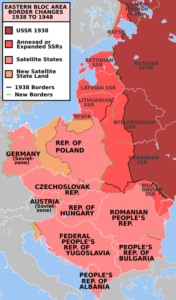
The Eastern Bloc Nations
Soviet Union on the verge of collapse
Russian bureaucratic imperialism relied on powerful extra-economic monopolies, further strengthened by totalitarian power. But their character was only extra-economic. As a result, it proved too weak or outright incapable of carrying out the Stalinist plans for the exploitation of satellite countries in Eastern Europe and the border regions of the People’s Republic of China. Faced with growing resistance in these countries, the Kremlin bureaucracy had to abandon “joint enterprises,” unequal trade exchange, and the colonial division of labor it wanted to impose. After the loss of Yugoslavia, as early as 1948, it gradually lost political control over China and a few other states, and also had to weaken its control over others.
Even within the USSR the extra-economic monopolies proved incapable of guaranteeing In the long term Russia’s imperialist domination over the main peripheral republics. Industrialization, urbanization, the development of education and more generally the modernization of the peripheries of the USSR as well as the increasing “nationalization” of their working class, the intelligentsia and the bureaucracy itself began to gradually change the balance of power between Russia and the peripheral republics in favor of the latter. Moscow’s dominance over them was weakening. The growing crisis of the system accelerated this process, which began to drive the Soviet Union apart. The central government’s countermeasures – such as the overthrow of the regime of Petro Chelest in Ukraine (1972), considered “nationalist” by the Kremlin – could no longer reverse this process, nor effectively stop it.
During the second half of the 1970s, the young Soviet sociologist Frants Cheregui tried to look at Soviet reality based on “Marx’s class theory, combined with the theory of colonial systems.” He then concluded that “the gradual expansion of the national intelligentsia and bureaucracy (of civil servants) of the non-Russian republics, the growth of the working class – in a word, the formation of a more progressive social structure – will lead the national republics to separate from the USSR.” A few years later, at the request of the highest authorities of the Soviet Communist Party, he studied the social situation of the youth teams mobilized by the Komsomol throughout the state to build the Baikal-Amur Railway Master. It was the famous “construction of the century”.
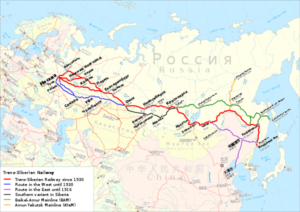
Baikal–Amur Mainline
“I became interested,” says Cheregui, “in the contradiction I discovered between the information on the international composition of the builders of the Magistrale, spread forcefully by official propaganda, and the high level of national uniformity of the construction brigades that arrived. They were almost exclusively composed of ethnically or linguistically Russian elements. “I then came to the unexpected conclusion that Russians (and ‘Russian speakers’) are pushed out of the national republics” – pushed back by the so-called titular nationalities, for example in Kazakhstan by the Kazakhs.
This was confirmed by research he conducted in two other major construction sites in Russia. “The central government knew this and participated in the resettlement of the Russians by financing the ‘great shock works’. I have concluded that since the social funds of the national republics have lost weight, there is a lack of jobs, including for representatives of the nationalities holding where social guarantees (crèches, holiday homes, sanatoriums, possibilities of obtaining housing) exist; such a situation can provoke inter-ethnic antagonisms, so the authorities gradually “repatriate” Russian youth from the national republics. So, I realized that the USSR was on the verge of collapse.” (19)
Military-colonial empire
The crisis of the Soviet bureaucratic regime and Russian imperialism was so great that to everyone’s surprise the USSR collapsed in 1991, not only without a world war, but even without a civil war. Russia completely lost its external peripheries, as 14 non-Russian republics of the Union left it and proclaimed independence – all those that, according to the Soviet Constitution, had this right. This meant a loss of territory, unprecedented in the history of Russia, with an area of 5.3 million km2. But, as Boris Rodoman, an eminent scientist who created the Russian school of theoretical geography, observes today too, “Russia is a military-colonial empire, living at the cost of unbridled waste of biological and human resources, a country of extensive development, in which the extremely squandering and expensive use of land and nature is a common phenomenon.” In this area, as well as with regard to “the migration of populations, the mutual relations between ethnic groups, between inhabitants and migrants in various regions, between State authorities and the population, the ‘classical’ features characteristic of colonialism remain vivid, as in the past“.
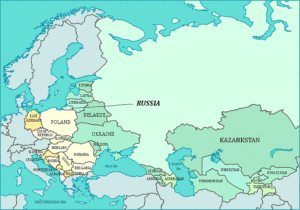
Post-Soviet Russia
Russia has remained a plurinational state. It includes 21 republics of non-Russian peoples, covering nearly 30% of its territory. Rodoman writes: “In our country we have an ethnic group, bearing its name and providing it with the official language, as well as a large number of other ethnic groups; some of them have national-territorial autonomy, but do not have the right to leave this pseudo-federation, that is, are forced to stay there. More and more often the need for the existence of separate administrative units according to ethnic criteria is questioned; the process of their liquidation has already begun with that of the autonomous districts. Yet almost no non-Russian people began to live in Russia as a result of migration; they have not resettled in an already existing Russian state – on the contrary, they are peoples conquered by that state, repulsed, partially exterminated, assimilated or deprived of their state. In such a historical context, national autonomy, even regardless of how real and only nominal, must be seen as moral compensation for ethnic groups that have suffered the “trauma of subjugation”. In our country small peoples who do not have national autonomy, or are deprived of it, are rapidly disappearing (e.g. the Vepses and the Chors). Indigenous ethnic groups, at the beginning of the Soviet period, were mostly autonomous. They are now in the minority because of colonization, linked to the appropriation of natural resources, major works, industrialization and militarization. The development of the “wastelands”, the construction of certain ports and nuclear power plants in the Baltic republics etc. not only had economic reasons, but also aimed at the Russification of the border regions of the Soviet Union. After its collapse, the military conflicts in the Caucasus, whose peoples are held hostage to the imperial policy of “is divide and rule”, are typical wars to preserve the colonies in a disintegrating empire. The extension of its sphere of influence, including the integration of parts of the former USSR, is now a priority of Russian foreign policy. In the eighteenth and nineteenth centuries, in Tsarist Russia, nomadic tribes pledged allegiance and thus their lands automatically became Russian; post-Soviet Russia distributes Russian passports to the inhabitants of border countries… ». (20)
Restoration of capitalist imperialism
The restoration of capitalism in Russia partially completed and partially replaced the extra-economic monopolies, weakened and truncated after the break-up of the USSR, with a powerful monopoly of finance capital welded with the state apparatus. Russian imperialism rebuilt on this basis remains an inseparably internal and external phenomenon, operating on both sides of Russia’s borders, which are beginning to move again. The Russian authorities have built a state mega-corporation, which will have a monopoly on the internal colonization of Eastern Siberia and the Far East. These regions have oil fields and other great wealth. They have privileged access to new global markets in China and the Western Hemisphere.
The two regions mentioned are likely to share the fate of Western Siberia. “The federal center keeps for itself almost all the oil revenues of western Siberia, not even giving Western Siberia the money for the construction of normal roads,” wrote Russian journalist Artem Efimov a few years ago. “The misfortune, as usual, is not colonization, but colonialism,” because “it is economic exploitation and not the planning and development of the territory that is the goal of the mentioned corporation. Essentially, it comes down to admitting that in the country, at the highest level of the state, colonialism reigns. The resemblance of this corporation to the British East India Company and other European colonial companies of the seventeenth-nineteenth centuries is so obvious that it could be funny. (21)
A year ago, the massive uprising of Ukrainians on the Kiev Maidan, crowned by the overthrow of Yanukovych’s regime, was an attempt by Ukraine to definitively break the colonial relationship that historically binds it to Russia. The current Ukrainian crisis – the annexation of Crimea, the separatist rebellion in Donbas and the Russian aggression against Ukraine – cannot be understood if one does not understand that Russia is still an imperialist power.
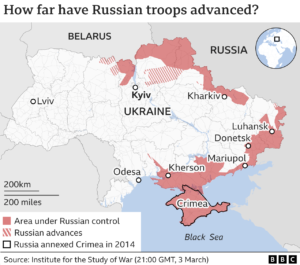
We take up this article from Le Monde diplomatique – Edycja polska, n°11 (105) of November 2014. (Translated from Polish to French by JM. Translated from French to English by Word translation program.)
http://www.inprecor.fr/~1750c9878d8be84a4d7fb58c~/article-Impérialisme-russe?id=1686
Notes
We have not translated the notes, many of which are to Russian sources and are given in transliteration.
(1) S.A. Nikolski, «Rousskie kak imperski narod», Polititcheskaïa Kontseptologia n° 1, 2014, pp. 42-43.
(2) M.N. Pokrovski, Istoritcheskaïa nauka i bor´ba klassov, Moscou-Leningrad: Sotsekizd, 1933, vol. I, s. 284.
(3) A.M. Doubrovski, Istorik i vlast´, Briansk: Izd. Brianskogo Gosoudarstvennogo Universiteta, 2005, s. 238, 315-335.
(4) Cf. J. Haldon, The State and the Tributary Mode of Production, London-New York : Verso, 1993; Iou.I. Semenov, Politarny (‘aziatski’) sposob proïzvodstva : Souchtchnost´ i mesto v istorii tchelovetchestva i Rossii, Moscou : Librokom 2011.
(5) A. Etkind, Internal Colonization: Russian Imperial Experience, Cambridge-Malden: Polity Press, 2011, p. 24, 26, 250-251.
(6) V.I. Lénine, Polnoe sobranie sotchineni, Moscou: Izd. Polititcheskoï Literatoury, 1969, 1973, vol. XXVI, p. 318; vol. XXVII, p. 378; vol. XXX, p. 174.
(7) L. Trotsky, Histoire de la Révolution Russe, Paris: Seuil, 1967, vol. I, p. 53.
(8) G. Safarov, Kolonialnaïa revoloutsia: Opyt Turkestana, Moscou: Gosizdat, 1921.
(9) M. Tukhatchevski, Voïna klassov, Moscou: Gosizdat, 1921, pp. 50-59. En anglais: M. Tukhachevsky, «Revolution from Without», New Left Review, n° 55, 1969.
(10) S. Mazlakh, V. Shakhrai, On the Current Situation in the Ukraine, Ann Arbor: University of Michigan Press, 1970.
(11) L. Trotsky, Staline, Saint-Pétersbourg: Lenizdat, 2007, vol. II, p. 189.
(12) A. Etkind, D. Uffelmann, I. Koukouline (éds.), Tam, vnoutri: Praktiki vnoutrenneï kolonizacii v koultournoï istorii Rossii, Moscou: Novoïe Literatournoïe Obozreniie, 2012, p. 29.
(13) Cf. D.R. Roediger, The Wages of Whiteness: Race and the Making of American Working Class, London-New York: Verso, 2007.
(14) J. Hasanli, At the Dawn of the Cold War : The Soviet-American Crisis over Iranian Azerbaijan, 1941-1946, Lanham-New York: Rowman and Littlefield, 2006; idem, Stalin and the Turkish Crisis of the Cold War, 1945-1953, Lanham-New York : Lexington Books, 2011.
(15) D. Logan [J. van Heijenoort], «The Eruption of Bureaucratic Imperialism», The New International, vol. XII, n° 3, 1946, pp. 74, 76.
(16) V. Dedijer, Novi prilozi za biografiju Josipa Broza Tita, Rijeka: Liburnija, 1981, t. I, p. 434.
(17) J. Broz Tito, «H kritiki stalinizma», Časopis za Kritiko Znanosti, Domišljijo in Novo Antropologijo, vol. VIII, n° 39/40, 1980, pp. 157-164, 172-185.
(18) V.M. Zubok, «The Mao-Khrushchev Conversations, 31 July-3 August 1958 and 2 October 1959», Cold War International History Project Bulletin, n° 12-13, 2001, p. 254.
(19) B. Doktorov, «Cheregui F.E.: “Togda ïa prichel k vyvodou: SSSR stoït pered raspadom’», Teleskop: Journal Sotsiologitcheskikh i Marketingovykh Issledovani, n° 5 (65), 2007, pp. 10-11.
(20) B.B. Rodoman, «Vnoutrenny kolonializm v sovremennoï Rossii», in T.I. Zaslavskaïa (éd.), Kouda idet Rossia ? Sotsïalnaïa transformatsiïa postsovetskogo prostranstva, Moscou, Aspekt-Press, 1996, p. 94; idem, «Strana permanentnogo kolonializma», Zdravy Smysl, n°1 (50), 2008/2009, p. 38.
(21) A. Efimov, «Ost-Rossiïskaïa kompania», Lenta.ru, 23 avril 2012.
(22) In the old language of the League of Nations, the USSR demanded the Libya be conceded to it as a “mandate.”